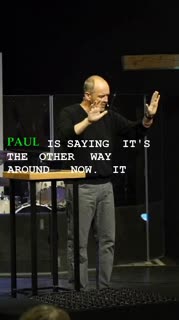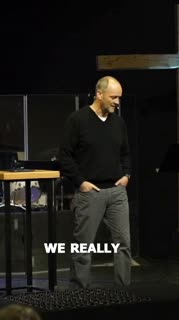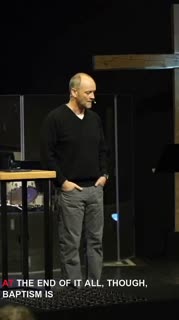Understanding Baptism: A Family's Faith Journey
Devotional
Sermon Summary
Bible Study Guide
Sermon Clips
1. "We can view the church in any number of different ways. You could view it as a lighthouse. You could view it as a hospital. But one of the very essential ways that we view the church in a literal sense is as a family. That's why we love our kids, pray for the kids, want our kids to grow up in a church liking church and enjoying church and it being a safe place." ([00:00:25] (20 seconds)
)
2. "The Bible says that when we come to faith in Christ, we're adopted by the Father, that Jesus is our older brother and he is the one who has brought us into this new family. And it's a beautiful picture because it means that regardless of your family situation, you're a part of the family when you're part of the church." ([00:00:50] (21 seconds)
)
3. "Be brought into worship by our elder brother, Christ. We're given all of these rights and privileges, including an inheritance. The church is God's family and it's an eternal family and it's something that we celebrate. So as much as we come alongside families within the church, the church does not exist for families." ([00:01:25] (21 seconds)
)
4. "It's important but necessary and necessary distinction to make. Subtle, I know, but it allows us to really understand what we're doing here, right? What we're doing here. In fact, that's why we're doing this series right now called Why We Do What We Do." ([00:01:58] (16 seconds)
)
5. "The gospel is preached and the people who hear it have a movement of both their mind and of their heart. They're convinced. They're convinced that Jesus is the Son of God. They're convinced that Jesus was more than just a human but that he was divine. He was the Messiah. They're convinced of it." ([00:09:36] (18 seconds)
)
6. "Paul is saying it's the other way around now. It begins spiritual, and it plays itself out physically. And what would be different in kind of as the picture of baptism would develop is that they would do their baptism differently than the Jews would. Instead of doing it every year, you would do it one time." ([00:15:56] (20 seconds)
)
7. "We really believe that salvation is a spiritual work of God for the individual. And God reveals himself, that he invites us into community, into his family, upon our repentance, in recognizing his love for us as demonstrated in the cross. And then we, in response to the hymn, are baptized and join the church." ([00:22:54] (23 seconds)
)
8. "At the end of it all, though, baptism is this radical obedience. An act of worship that Christ is involved in. It's not a means of salvation, but it is a means of grace. Here's what I mean by that. That when someone decides to be baptized, when someone makes that decision to tell the world, I'm a follower of Jesus, and I'm going to live on his mission and seek to find victory in my faith, that when they say that, they're testifying to some crazy mystery." ([00:29:37] (38 seconds)
)
9. "It is not this emotionally high thing. It is a movement of God, of his spirit, because Jesus is still alive, and he's still working. It's a means of grace, and it's a beautiful and powerful thing." ([00:31:14] (15 seconds)
)
10. "That's why we take communion, and I'm going to invite you, as we continue to worship and meditate and think about what Christ is doing in our hearts and doing in our world, that we would take very seriously what it means for him to be our Lord and our Savior." ([00:31:58] (19 seconds)
)
Ask a question about this sermon
)
2. "The Bible says that when we come to faith in Christ, we're adopted by the Father, that Jesus is our older brother and he is the one who has brought us into this new family. And it's a beautiful picture because it means that regardless of your family situation, you're a part of the family when you're part of the church." ([00:00:50] (21 seconds)
)
3. "Be brought into worship by our elder brother, Christ. We're given all of these rights and privileges, including an inheritance. The church is God's family and it's an eternal family and it's something that we celebrate. So as much as we come alongside families within the church, the church does not exist for families." ([00:01:25] (21 seconds)
)
4. "It's important but necessary and necessary distinction to make. Subtle, I know, but it allows us to really understand what we're doing here, right? What we're doing here. In fact, that's why we're doing this series right now called Why We Do What We Do." ([00:01:58] (16 seconds)
)
5. "The gospel is preached and the people who hear it have a movement of both their mind and of their heart. They're convinced. They're convinced that Jesus is the Son of God. They're convinced that Jesus was more than just a human but that he was divine. He was the Messiah. They're convinced of it." ([00:09:36] (18 seconds)
)
6. "Paul is saying it's the other way around now. It begins spiritual, and it plays itself out physically. And what would be different in kind of as the picture of baptism would develop is that they would do their baptism differently than the Jews would. Instead of doing it every year, you would do it one time." ([00:15:56] (20 seconds)
)
7. "We really believe that salvation is a spiritual work of God for the individual. And God reveals himself, that he invites us into community, into his family, upon our repentance, in recognizing his love for us as demonstrated in the cross. And then we, in response to the hymn, are baptized and join the church." ([00:22:54] (23 seconds)
)
8. "At the end of it all, though, baptism is this radical obedience. An act of worship that Christ is involved in. It's not a means of salvation, but it is a means of grace. Here's what I mean by that. That when someone decides to be baptized, when someone makes that decision to tell the world, I'm a follower of Jesus, and I'm going to live on his mission and seek to find victory in my faith, that when they say that, they're testifying to some crazy mystery." ([00:29:37] (38 seconds)
)
9. "It is not this emotionally high thing. It is a movement of God, of his spirit, because Jesus is still alive, and he's still working. It's a means of grace, and it's a beautiful and powerful thing." ([00:31:14] (15 seconds)
)
10. "That's why we take communion, and I'm going to invite you, as we continue to worship and meditate and think about what Christ is doing in our hearts and doing in our world, that we would take very seriously what it means for him to be our Lord and our Savior." ([00:31:58] (19 seconds)
)










